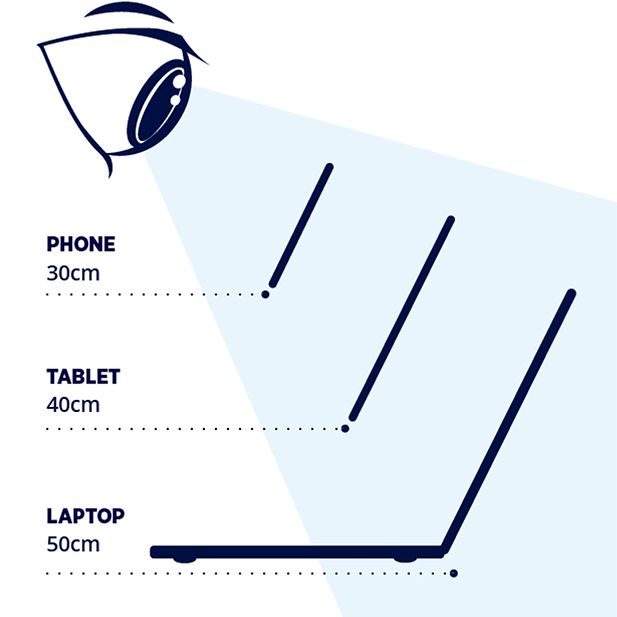Nowadays we are surrounded by technology. We work in front of the computer and spend our free time in front of the television or scrolling our mobile phones. In this digital world where electronic devices play a key role in our lives, it is important to pay special attention to our visual health, as our eyes can be seriously affected by this continuous exposure. We advise that you remain conscious of your relationship with your screen time as it can result in an eye strain known as computer vision syndrome. Read on to learn more about the symptoms, causes, and best tips for caring for your eyes.
Free delivery for orders £59 and up
Free delivery for orders £59 and up
What is computer vision syndrome? Symptoms, causes

Computer vision syndrome (CVS), also known as digital eye strain or digital visual syndrome (DVS), is a consequence of the time we spend in front of screens. Looking at a screen that emits intense light, and having to focus and defocus at different distances, requires an accommodative effort for many hours at a time. In addition, the presence of glare and glare from screens can be harmful to your eye health.
Spending more than 3 hours a day in front of a phone, computer or tablet is enough time to cause eye disorders. Many people have already exceeded this limit during their working hours alone, so if we add to that the leisure time in front of a screen, this amounts to a considerable amount of screen time, resulting in serious visual problems.
Symptoms of computer vision syndrome
- Red eyes. Keeping eyes open while looking at a strong light source causes inflammation of the blood vessels and the appearance of redness and itching.
- Eye fatigue. Demanding so much prolonged effort from our eyes without rest can lead to blurred vision and eye irritation.
- Dry eye. Dry eye is one of the most common symptoms of CVS. When we are concentrating on the screen, sometimes we forget to blink and this generates greater eye dryness.
- Headache. The intense light and the pressure to which our eyes are subjected continuously can give rise to headaches.
- Photophobia. Another consequence of CVS is the development of hypersensitivity to light, both natural or artificial.
- Dizziness. The continuous stimuli to which our eyes are exposed in front of a screen can generate a sensation of vertigo or even double vision.

Tips to avoid digital eye strain
We are aware that it is almost impossible to reduce the use of screens. For many, screen time is part of your work activity and we understand that reducing it is tricky. But there are small habits you can adopt to reduce the impact on your eyes and avoid eye discomfort:
- Appropriate distance from the computer. When it comes to eye health, ergonomics plays a key role. Your computer screen or monitor should be between 50 and 65 cm away from you. It should also be more or less at the same level as your eyes to avoid neck problems. The monitor and keyboard should be positioned in a straight line with you.
- Screen with good resolution. Working with a screen that has a good resolution and is of good quality is necessary to avoid eye strain
- 20-20 rule. Practice this rule every 20 minutes. You should take 20-second breaks to look at an object 6 metres away. In this way you will be giving your eyes a break and you will be able to return to your activity with your batteries recharged.
- Use eye drops. Having eye drops, or artificial tears, on hand is essential to combat many of the symptoms of CVS.
- Correct posture. Sitting with a straight back and promoting good posture is essential to avoid neck pain. It is also important to take breaks and stand up from time to time to stretch your legs and give your spine a rest.
- Voluntary blinking. When we are concentrating we don't realise it, but we often forget to blink. Forcing yourself to blink is an important exercise to fight eye strain and dry eyes and strengthen your eye muscles.
- Visit your ophthalmologist. In more severe cases in which the symptoms persist in a severe and prolonged manner, you should make an appointment with a doctor.
- Have an eye examination. If you spend a lot of time in front of screens and you don't check the condition of your eyes, the consequences can be even worse. Visit your optometrist, book an eye examination, and choose the right contact lenses for your eyes.
- Spend your free time on a screen detox. We know that after a long day at work, it's tempting to turn on the TV and watch the latest episode of your favourite series. Scrolling through Tik Tok and watching adorable kittens and people doing impossible dances is a great way to unwind, and like these, there are plenty of activities that involve an electronic device in between. But how about going outside, having a coffee with a friend, doing some sport, reading a good book while enjoying a cup of tea or just taking a walk? Give your body and your eyes what you really need.
In this digital world where electronic devices play an important role in our lives, it is important to pay attention to the health of our eyes. So make sure you don't run a Netflix marathon every day or watch your smartphone all day!

Eye drops for computer vision syndrome
Do you find that prolonged periods in front of a screen causes you to have dry or irritable eyes? If so, we strongly recommend eye drops. everclear eye drops have been specially developed to provide quick relief for dry and tired eyes. Due to the unique formula, the lack of natural tear fluid is immediately replenished. The bottle contains 10 ml, which fits easily in your bag or pocket. These eye drops can be used with all types of soft contact lenses.

